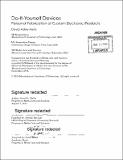Do-it-yourself devices : personal fabrication of custom electronic products
Author(s)
Mellis, David Adley
DownloadFull printable version (21.06Mb)
Alternative title
DIY devices : personal fabrication of custom electronic products
Personal fabrication of custom electronic products
Other Contributors
Massachusetts Institute of Technology. Department of Architecture. Program in Media Arts and Sciences.
Advisor
Mitchel Resnick.
Terms of use
Metadata
Show full item recordAbstract
Many domains of DIY (do-it-yourself) activity, like knitting and woodworking, offer two kinds of value: the making process itself and using the resulting products in one's life. With electronics, the sophistication of modern devices makes it difficult to combine these values. Instead, when people make electronics today, they generally use toolkits and other prototyping processes that aren't well suited to extended use. This dissertation investigates digital fabrication (of both electronic circuit boards and enclosures) as an alternative approach to DIY electronics, one that can support individuals in both making devices and using them in their daily lives. The dissertation explores three questions: (1) What are the scope and limits of the personal fabrication of electronic products? (2) How can we engage people in the personal fabrication of electronic products? (3) Why make electronic products using personal fabrication? These questions are explored through two investigations. The first is a DIY cellphone, including an autobiographical approach exploring my making and use of the device. Also documented are workshops and other dissemination in which others have made their own phones. The second investigation is a six-week workshop in which participants designed and made internet-connected devices. The investigations reveal personal fabrication as a robust, open-ended, and nuanced means of making devices for use in daily life, but with limitations and constraints imposed by the commercial ecosystem surrounding this DIY practice and by the nature of electronic products. Analysis of the workshops reveals multiple trajectories that people take in these activities; the computational concepts, skills, and practices they develop; and strategies for engaging them. Finally, the investigations reveal multiple values for the personal fabrication of electronic products, including its ability to
Description
Thesis: Ph. D., Massachusetts Institute of Technology, School of Architecture and Planning, Program in Media Arts and Sciences, 2015. Cataloged from PDF version of thesis. Includes bibliographical references (pages 171-178).
Date issued
2015Department
Program in Media Arts and Sciences (Massachusetts Institute of Technology)Publisher
Massachusetts Institute of Technology
Keywords
Architecture. Program in Media Arts and Sciences.